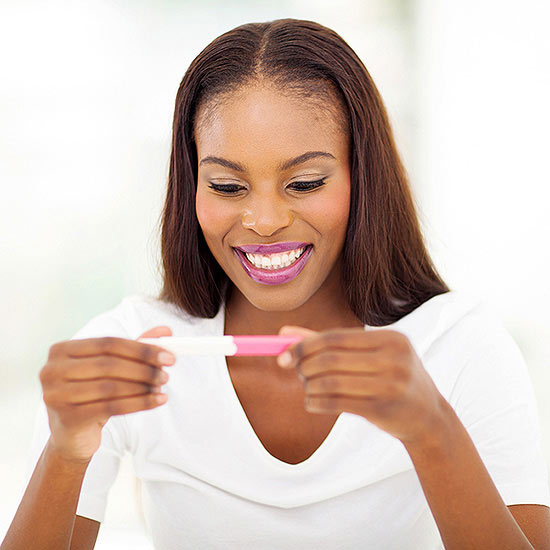
You've probably heard "I didn't know I was pregnant" stories that went something like this: A woman claims she took an at-home pregnancy test that came back negative, but, lo and behold, she really was pregnant — and the pregnancy progressed without her knowledge. It's a scary thought, but you shouldn't worry about it happening to you. False negative pregnancy tests don't really happen, as long as you're taking the test correctly. But there are some reasons why you could get a negative reading when you're actually pregnant — so this is what to avoid:
Taking the test too early
Even if you're champing at the bit to know whether or not you're expecting, wait until you've missed your period to take the test. "Home pregnancy tests are a qualitative test and measure whether or not hCG — the pregnancy hormone human chorionic gonadotropin — is present in your urine," explains Stephen Rechner, M.D., the Division Chief of General Obstetrics and Gynecology at Spectrum Health in Grand Rapids. "A detectable amount of this hormone is typically not seen until after the first missed period."
After your period was due, the accuracy of your home pregnancy test is 97 percent, says Sean Daneshmand, M.D., an ob-gyn based in San Diego and the founder of the nonprofit organization Miracle Babies. The remaining 3 percent may simply need a little more time. Because women's menstrual cycles can vary, those women may not have enough hCG for the test to pick up yet. "If you receive a negative pregnancy test, you should wait a few days and try it again," says Dr. Rechner.
HCG levels in your blood increase rapidly if you really are pregnant — they should double approximately every 48 hours — so you should be able to trust the negative test result if you took the test about a week after you missed your period.
Most women find out they're pregnant about four to six weeks after the first day of their last period, says Dr. Daneshmand.
Using an expired pregnancy test
Be selective when you buy your pregnancy test. Check the box to make sure it hasn't passed its expiration date, in which case it probably won't work properly, says Dr. Daneshmand.
Taking the test incorrectly
Follow the instructions that come with your pregnancy test carefully to be sure you're taking it the right way. Dr. Rechner advises taking the test first thing in the morning, as the concentration of hCG in your urine is usually highest then.
Copyright © 2015 Meredith Corporation.
All content on this Web site, including medical opinion and any other health-related information, is for informational purposes only and should not be considered to be a specific diagnosis or treatment plan for any individual situation. Use of this site and the information contained herein does not create a doctor-patient relationship. Always seek the direct advice of your own doctor in connection with any questions or issues you may have regarding your own health or the health of others.




